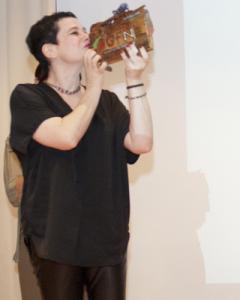Stephen Downes
Wednesday, 03 Dec 2014
More Than Apps and Gadgets
Umair Haque, who is perhaps the only economist I can read without suffering indigestion, quite rightly condemns today’s penchant for addressing social problems with yet another app. “If you believe that Ubers, tacocopters, and dating-slash-butler apps…change the world…especially this world,” he writes, “you’re not just clueless. You’re hopeless.” [1]
So what does matter? “Make a vaccine for Ebola. Give the half the world missing it clean water, education, sanitation. Fix global youth unemployment. Give women and minorities a way to use the web without being harassed.” Stuff like that. Concrete, tangible good produced that measurably and meaningfully improves the lives of people and propels us toward higher aspirations.
This is a bit of a challenge for a web-monger like me. For the last twenty years or so I’ve been scripting my own versions of things I think would help – a learning management system here, an open website on the logical fallacies there, learning networks, open online courses, and most recently, personal learning environments. It’s hard not to wonder whether I’m not just serving up more of the same slop that has led us to where we are today.
Haque is pretty clear about what is not useful. “Apps, gadgets, hearts, likes,” he writes. “Taps, clicks, swipes, screens. These numb us with comfortable titillation.” They prevent us from aspiring to something more. “Things that make people…butlers, chauffeurs, maids, courtesans…debtors, sharecroppers, zombies…don’t change anything.”
He’s right, of course. The best inventions are liberating. They give us life, they nourish us, they advance us, they engage us, they empower us. They are not things that help us to become better workers, better servants, better employees.
That, if I may share a secret, is what has always bothered me about my work in education. In so many ways, we are either working to keep in power those who are already in power, providing them elite educations at exclusive universities, or we are perpetuating the servitude of the working people, teaching employment skills and vocational trades to the children of factory workers and farmers. And educators themselves, especially in today’s outcomes-based environment, are so often cast in the role of the butler or the maid, pandering to, rather than enlightening, the children of our employers.
I’ve always aspired to something more. I’ve always believed that at the end of my career, when I looked back, I would look on a body of work that led to something more significant than an app or a servlet.
That is why I am engaged not merely in the development of learning technology, but also engaged in the development of means, methods and mechanisms to deliver open learning – with ‘open’ being thought of in the widest and most liberating sense. And when I design educational systems – even when I am working with partners in government and industry – I am first and foremost thinking of my client as the students and learners themselves. And that is why I think in terms not of pedagogy and learning design, but in terms of self-management and personal development.
Educational technology is meaningless if it is not also liberating technology. The purpose of education is not to serve certain social objectives or as a means to employment, but rather to place in the hands of the learner the best and most useful set of tools possible to enable him or her to choose and forge the best quality life for themselves, or as John Stuart Mill would say, to pursue their own good in their own way. Because I believe the best society and the best employment are not those defined by one person over another, but those chosen and built by the people themselves.
We need to remember this when we are building our trinkets and baubles. We can build a better world out of the simplest elements, but only if we image what a better world is like, and refuse to be swayed on our pursuit of it.
Disclaimer: This publication has been licensed by The National Research Council of Council. Content may be re-published and shared on the condition that all attributions and acknowledgement is given to the author Stephen Downes and The National Research Council of Canada. Note, this article falls under copyright to the Crown in Right of Canada, that is, to the Government of Canada
+
Re. re.
